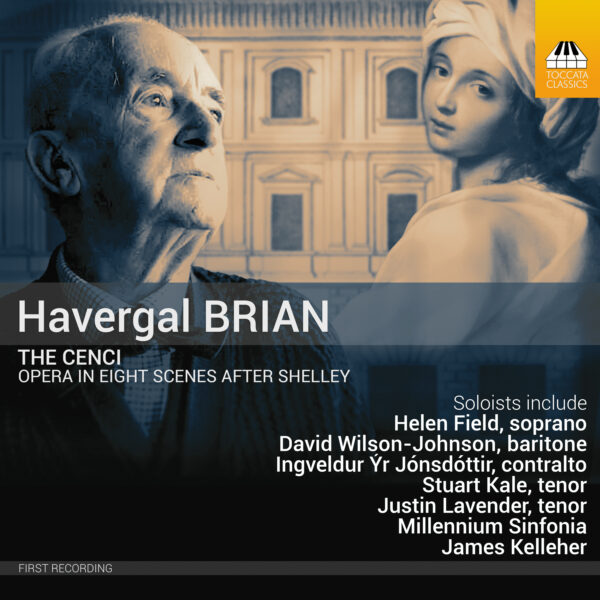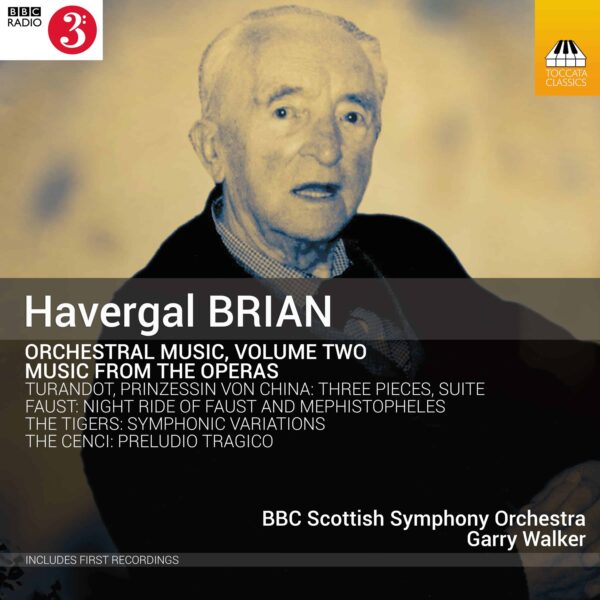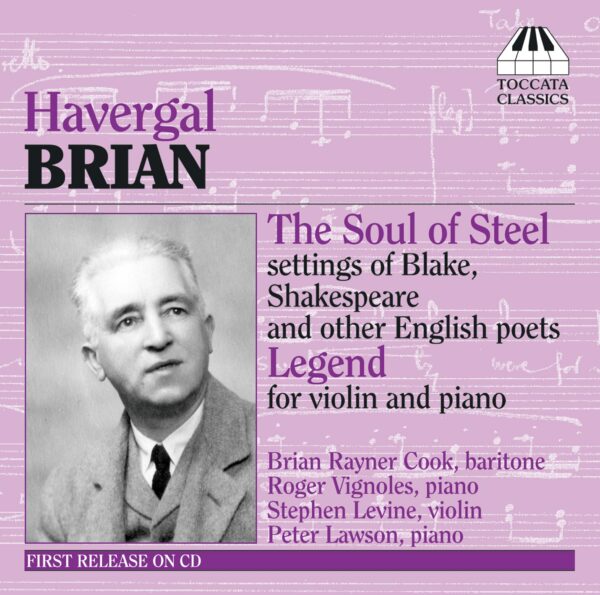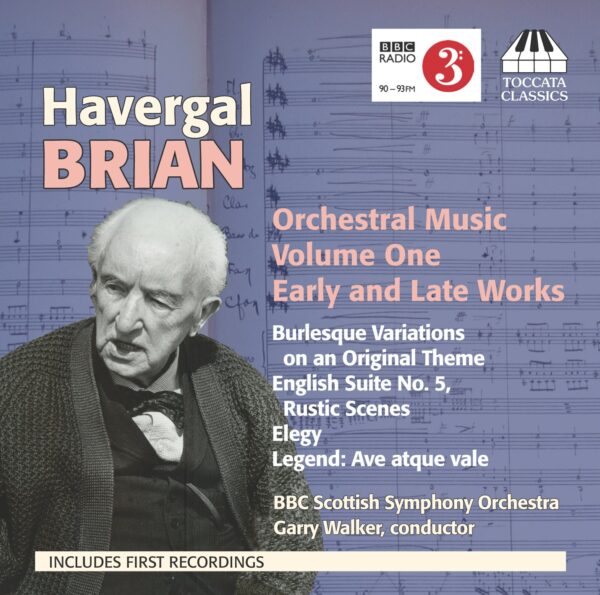Havergal Brian: The Cenci
The Cenci (1951–52) is Havergal Brian’s operatic realisation of Shelley’s gruesome tale of incest and parricide in Renaissance Italy. The score calls it simply ‘Opera in Eight Scenes’, but it rarely goes in for grand tunes; instead, its dark colours reflect Shelley’s fascination with the struggle between good and evil. Stylistically, it is an unusual but highly effective hybrid: a music-drama focused on the intense delivery of Shelley’s text, with the declamatory style of the vocal lines echoing such recent oratorios as Stravinsky’s Oedipus Rex and Honegger’s Jeanne d’Arc au bûcher, and the freewheeling orchestral writing producing something of a vocal symphony.
Helen Field, soprano
David Wilson-Johnson, baritone
Ingveldur Ýr Jónsdóttir, contralto
Stuart Kale, tenor
Justin Lavender, tenor
Jeffery Carl, baritone
Nicholas Buxton, tenor
Devon Harrison, bass
Serena Kay, soprano
The Millennium Sinfonia
James Kelleher, conductor
Listen To This Recording:
The Cenci
CD1
- Overture (Preludio Tragico) (13:57)
- Scene 1: An apartment in the Cenci palace, Rome (8:48)
- Scene 2: A Garden of the Cenci palace, Rome (7:45)
- Scene 3: A magnificent hall in the Cenci palace, Rome: A banque (10:26)
- Scene 4: An apartment in the Castle of Petrella (among the Apulian Apennines) (13:17)
CD2
- Scene 5: Before the Castle of Petrella (15:59)
- Scene 6: An apartment in Orsino’s palace, Rome (6:16)
- Scene 7: The Hall of Justice, Rome (9:55)
- Scene 8: A hall of the prison (15:05)




Fanfare Magazine :
‘The music, like Brian’s symphonies, is written in post-Romantic vein, with an extraordinarily rich and effective orchestration. overture is a miniature tone poem that deserves to be excerpted as a concert piece. It is a splendid work. […] That style makes all the more powerful Beatrice Cenci’s final farewell to her brother before their execution, where Brian gives her a soaringly powerful scene to bring about the opera’s conclusion before Beatrice concludes with spoken words over a tender, touching orchestral conclusion. […]
It is hard to imagine a more persuasive recording of the work. Although this is a single-take live recording, there is stunningly little that goes awry. The orchestra plays with precision, Kelleher has clearly studied the score and loves it, and the recorded balances are particularly fine considering the heaviness of some of the orchestration. Helen Field and David Wilson-Johnson as Beatrice Cenci and her brother the Count are terrific. They enunciate the text clearly and with meaning (Toccata’s printed libretto is still useful, as some of Brian’s word setting does not lend itself to easy comprehension), and they sing passionately. The remainder of the cast is excellent, with everyone doing their best to communicate the opera’s music and emotions. […]
Anyone who enjoys the late Romantic idiom is likely to find enough pleasure here to repay the time invested in listening to it. […] Toccata and the Havergal Brian Society deserve plaudits for making the work available and for doing so at a high level.
—Henry Fogel, Fanfare Magazine, Sept/Oct 2024
Gramophone :
‘Conductor James Kelleher assembled a fine cast for the performance, with David Wilson-Johnson magnificent as the unrepentant Cenci, Ingveldur Ýr Jónsdóttir as his long-suffering wife Lucretia, Stuart Kale as Cardinal Camillo and Justin Lavender as the despicable Orsino. All are eclipsed ultimately, however, by Helen Field as Beatrice, the strongest character of all, feisty in scene 3 where she defies her father, resilient in scene 7’s trial and radiant in her acceptance of her fate (execution for parricide) at the close. The Millennium Sinfonia play astonishingly well, sounding every bit the opera orchestra. Toccata Classics’ sound, originally recorded by Geoff Miles of Floating Earth, has been magnificently remastered by Adaq Khan. Brianophiles will, no doubt, acquire this set, but so should anyone with the slightest interest in 20th-century opera. Strongly recommended.’
—Guy Rickards, Gramophone
Gramophone :
‘Gramophone Editor’s Choice
The only performance of Havergal Brian’s early 1950s opera The Cenci was given in 1997 and is thankfully preserved here on this valuable release from the Toccata label.’
—Gramophone
BBC Music Magazine :
‘The darkness of the story is framed by a performance [with] the commitment of a quality cast led by Helen Field and David Wilson-Johnson, and conductor James Kelleher.
[The work has] a touchingly effective ending. Decent recording and excellent presentation.
—BBC Music Magazine
MusicWeb International :
‘Helen Field, an excellent Janáček and Strauss exponent, takes the role of Beatrice and hers is a fierce assumption, the voice flaring powerfully. […] Her father, the Count, is David Wilson-Johnson, implacable and resolute, as he negotiates his terse and difficult lines. Brian’s sense of characterisation includes moments of dissonant mockery, such as begins Scene 3, set in the Cenci Palace in Rome, when the brassy fanfares are curdled by those dissonances whilst Cenci and his nobles are accompanied by music of glowering intensity. The urgency of the declamatory orchestral writing here is clear, its uneasiness prefiguring Beatrice’s powerful defiance. […]
Brianites will welcome this 1997 production and will want to salute the dedication of cast and orchestra and conductor, James Kelleher, who is responsible for much of its success.
One of [the booklets] 60 pages that features multiple contributors on a range of themes that includes details of the cast. John Pickard’s chapter on the music is illuminating as is Kelleher’s own note whilst the details about Shelley’s text are not only of academic interest. […]
This is a work of bleak power, set with dedication’
—Jonathan Woolf, MusicWeb International
AllMusic :
‘This release made classical best-seller lists in the spring of 2024. It is easy enough to see why; the cast is very strong, with soprano Helen Field in top form as Beatrice Cenci and David Wilson-Johnson as the malevolent Count. The opera is swift, with eight scenes and one act, clocking in here at just over an hour and 40 minutes, and conductor James Kelleher, leading the Millennium Sinfonia, wisely does not let up on the pressure. The vocal writing is exacting but would not be beyond the reach of a university production, and for that reason alone, the album is welcome. General listeners will find new insights here into the fascination the Italian Renaissance held for 19th century English poets.’
—James Manheim, AllMusic
Arcana.fm :
‘What’s the story?
Toccata Classics fills a major gap in the Havergal Brian discography with this release of his opera The Cenci, given its first hearing 27 years ago by a notable roster of soloists with The Millennium Sinfonia conducted by James Kelleher, and accorded finely refurbished sound. […]
Not its least fascination is the Preludio Tragico that, at 14 minutes, is less an overture than an overview of what ensues – akin to Beethoven’s Leonora No. 2 in its motivic intricacy and expressive substance – which would most likely warrant a balletic or cinematic treatment in the context of a staging. Perfectly feasible as a standalone item, this received its first hearing in 1976 and was recorded by Toccata Classics in 2009 (TOCC0113). Ably negotiated by his players, Kelleher’s lithely impulsive account accordingly sets the scene in unequivocal terms. […]
What follows are eight scenes which encapsulate this drama to compelling […] effect. […] Brian’s handling of dramatic pacing leaves little to be desired. […] Musically, this is typical of mature Brian in its quixotic interplay of moods within that context of fatalism mingled with defiance as few other composers have conveyed so tangibly. […]
Does it all work?
Very largely, owing to as fine a cast as could have been assembled. Helen Field is unfailingly eloquent and empathetic as Beatrice, with such as her remonstrations at the close of the fifth scene and spoken acceptance at that of the eighth among the highpoints of mid-20th century opera. David Wilson-Johnson brings the requisite cruelty but also a sadistic humour to Count Cenci, and Ingveldur Ýr Jónsdóttir is movingly uncomprehending as Lucretia. The secondary roles are expertly allotted, notably Justin Lavender’s scheming Orsino and stricken Bernardo. The Millennium Sinfonia responds to Brian’s powerful if often abrasive writing with alacrity under the assured guidance of James Kelleher, and if the sound does not make full use of the QEH’s ambience, its clarity and immediacy tease unexpected nuance from the orchestration. […]
Is it recommended?
It is indeed. The Cenci is unlikely to receive further performances (let alone staging) any time soon, so this reading gives a persuasive account of its manifest strengths and relative failings. Kelleher is ‘‘formulating plans to return to conducting’’ and ought to be encouraged to do so.’
—Richard Whitehouse, Arcana.fm
Diapason :
‘Assemblé pour la circonstance, l’orchestre rend justice à cette partition foisonnante. Bravo à l’éditeur de défendre cette rareté en lui consacrant une notice très détaillée et en joigna nt le texte intégral (en anglais seulement) des scènes retenues par Brian!’
—Jean-Claude Hulot, Diapason
Fanfare :
‘[…] there’s still force aplenty in this opera, magnificently represented in this unedited recording drawn from an electrifying concert performance, the only one the opera has received. […] the quality of the singing [is] tremendous. […]
Helen Field is a radiant Beatrice, brilliantly capturing that paradoxical blend of innocence and implacable desire for revenge. She serves as a perfect foil for the malevolence spit out by David Wilson-Johnson […]. Stuart Kale is magnificently strong and confident as Cardinal Camino, and most of the rest of the singers hold their own in often ungrateful parts. The orchestra, under the knowing guidance of Kelleher, plays well, coursing through a tricky score that’s not easy to make sense of. […]
Fortunately, a larger crowd will now have the opportunity to experience it. As usual, Toccata’s presentation, which includes a full libretto and a 60-page book of essays, is first-class.
Fogel ended his review by saying, “Toccata and the Havergal Brian Society deserve plaudits for making the work available and for doing so at a high level”—and I can only echo his praise.’
—Peter J. Rabinowitz, Fanfare